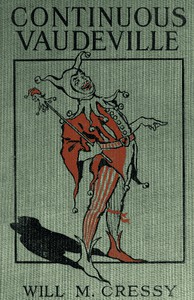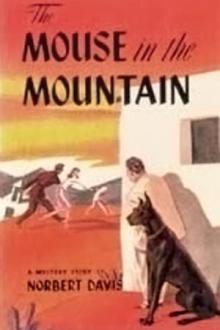Continuous Vaudeville, Will M. Cressy [top 10 inspirational books TXT] 📗

- Author: Will M. Cressy
Book online «Continuous Vaudeville, Will M. Cressy [top 10 inspirational books TXT] 📗». Author Will M. Cressy
"Well, I am astonished," said Tom. "I never dreamed Caroline was that kind of a woman. What does she do with all this money?"
"God knows, Mars' Tom. I hain't never give her none yet."
We were playing in New York. Preceding us on the bill were the Martin Brothers, playing for twenty-two minutes on Xylophones. After the show a friend of ours from Hartford, Conn., joined us at lunch. We were discussing the show and finally he said,
"Will, do you know I could live a long time, and be perfectly happy, if I never heard one of those picket-fence soloists again."
My wife was drinking a glass of iced tea; he kept glancing at it and finally he said,
"Do you know, I can understand anybody[102] drinking that stuff at home; or if somebody had given it to you. But the idea of anybody buying it! and paying for it."
About whose pleasant fancies full many a tale is told.
But when old age o'ertook them, with its many, many qualms,
King Solomon wrote the Proverbs and King David wrote the Psalms.
In a restaurant window on Thirteenth Street, St. Louis:
"Small Steak, 20 cents. Extra Small Steak, 25 cents."
In a bakery window in Omaha:
"Homemade pize fifteen cents."
"Married: At East Walpole, Mass., Jan. 27th, 1912, Robert P. Bass, Governor of New Hampshire, and Miss Edith Harlan Bird."
(The members of the New Hampshire Fish and Game League will now arise and sing: "What Shall the Harvest Be.")
[103]
The hardest luck story I have run across lately was a fellow playing a moving picture house in Salt Lake City who had a check come to him by mail. The check was for twenty-five dollars; and the only man in town who could identify him was a man he owed thirty dollars.
I see there is an act playing in Vaudeville this year by the name of Doolittle & Steel. Make your own jokes.
[104]
HOW MIKE DONLIN SHRUNKThe management of the Majestic Theater in Chicago always have a small sign at the side of the stage announcing the headline act for the following week. Upon this particular occasion this sign announced the coming of Mabel Hite and Mike Donlin.
There was a chap sitting down in front with his girl, who wanted her to think that he knew everybody and everything in Vaudeville. You know, one of those people who call all actors and actresses by their first names, and can tell you (incorrectly) all about their private affairs.
Finally it came time for Melville & Higgins to appear; and in order for you to appreciate this incident, I will mention that Mr. Higgins is built on the same general principle as a string bean; he has been known to conceal himself behind an umbrella.
Now when it is time for this act to come on, all the lights in the house are thrown out, and a spot[105] light is thrown on the stage over near the entrance from which they are to come on. It so happened on this occasion that the light just covered the sign announcing "Mabel Hite & Mike Donlin" but did not light up the words "Next Week."
The Bureau of Mis-information down in front, with his lady-love, had just started to look at his program when the lights went out, so that he had been unable to make out who came next. Now he looked up and saw that sign for the first time—"Mabel Hite & Mike Donlin."
"Why, I thought they were here next week," he said. "Now you will see something good."
Just then Melville & Higgins walked out on the stage. The chap down in front started to applaud, then his jaw dropped, and he gasped out,
"My God, how Mike has fallen away."
The manager of a small Moving Picture and Vaudeville Theater in Lincoln, Nebraska, was watching the opening show of the week. A Horizontal Bar came on, two men, one a straight acrobat, the other a clown. As soon as the act was over the manager went back and fired the clown.
[106]"Fired?" said the clown in amazement; "what for?"
"Because you can't do nothin'; you missed every trick you went after; t'other feller is all right; he can work."
Joe Keaton, "the Man With the Table, a Wife and Three Kids," was in three hotel fires inside of fourteen months. But he always managed to get his little family out safe. In addition to doing that, he always managed to save something; and that something was the same every time. When they had all got down the fire escapes, and had reached a place of safety, Joe would find clutched tightly in his hand—a cake of soap.
One night Ezra Kendal left his wife at the elevator in the Union Hotel in Chicago, saying that he would be right up in a few minutes. Two hours later he came up to the room.
"Where have you been all this time, Ezra?" asked his wife.
"I met a couple of Interlocutors downstairs, and I have been doing End Man to them," said Ezra.[107]
 It Isn't the Coat that makes the Man.
It Isn't the Coat that makes the Man.
Fred Niblo and his wife (Josephine Cohan) were playing at Proctor's 23d Street Theater in New York. Fred always wore a Prince Albert coat in his act. On this day he had considerable trouble in getting his necktie to suit him. Finally he got arranged, slipped on the Prince Albert, buttoned it, took one final look into the glass, and started for the door.
"Where are you going, dear?" asked Mrs. N. in that wifely tone that always makes a man shrink.
[108]"Why, I am going out to do my act," said Fred. "Why?"
"Oh, nothing," said Mrs. N., "only I thought perhaps you would want to put some trousers on."
[109]
A NIGHT IN BOHEMIAWhen George W. Day got married he took awful chances. Well, of course, we all do, for that matter; but George took more than usual, for he married into a Scotch Presbyterian family, and anybody knows that Actors and Scotch Presbyterians were not originally created for Affinities. But George, in addition to being an Actor, is a Musician, an Artist and a Corking Good Fellow, and the wife's folks, after taking him on probation for ten or fifteen years, finally decided that they would accept him into the family.
Up to two or three years ago, Mother-in-law was the only one of the family who had visited Mr. and Mrs. George in their New York home; the rest of the family had continued to reside in Peaceful Valley, or wherever it was, and hope for the best for that poor erring daughter who had fallen victim to the wiles of "a Actor." But finally Mr. and Mrs. George and Mother-in-law[110] had persuaded Mother-in-law's two sisters and one of the sister's husbands to come down to New York and visit the Days.
Uncle Abinidab was a tall, ministerial appearing man, "ninety years of age, and whiskers down to here"; he dressed in a black pair of trousers, a black Prince Albert coat, black tie, and a black slouch hat.
The two aunts wore the black silk dresses that their father had brought from India sixty years ago. Mother-in-law was also dressed in black.
George worked in as many "neutral tints" on his own wardrobe as he could, trying to "tone down" to fit the occasion. The ice box was used for the sole purpose of storing food; George's cigars, pipes and tobacco were locked up in an old trunk in the storeroom. The family Bible was hunted up, dusted, and placed in a conspicuous position on the centertable in the front room. George carefully censored his drawings which were stuck up on the walls all over the house; and any lady who did not have on a Buffalo overcoat and rubber boots was placed out in the trunk with the pipes.
The week that followed was "one round of gayety" for the folks. George walked off over[111] five pounds showing them the Brooklyn bridge, Central Park, Grant's tomb, Fifth Avenue, Fleischman's bread line, Macy's store, the post-office, Tammany Hall, and every church in the city.
It took them the first five days to play this route. And then on Friday night Mother-in-law horrified George by informing the others that on the next day she and George would show them Coney Island. By going out early in the morning, and in the evenings, and rehearsing his day's route in advance, George had managed so far to conduct his little Company around the city without running them into any "High Life." But he knew that if that crowd ever struck Coney Island on a good busy afternoon, his hopes of becoming a favorite son-in-law were gone.
But Mother insisted, so the next morning he took Deacon Abinidab and the three "sisters in black" and started for Coney Island. Although I have examined him closely on this point, he does not seem to have any very clear idea yet as to where they went that day, or what they did. All he can say is that "it was awful." They insisted on Hot Dogs, Pop Corn, Peanut Brittle, Dreamland, Luna Park, and all the rest; they went[112] through the Old Mill, and they made George come down the "Bump the Bumps," "Shoot the Shoots" and such other exhilarating devices as they did not dare to tackle themselves.
They had supper in Henderson's, watching the Vaudeville show on the stage as they ate. They watched the fireworks, and it was ten o'clock before George could get them started toward home. When he got them on the train, homeward bound, he heaved a sigh of mighty relief, but afterwards regretted wasting a sigh of that sort in that way.
Arriving in New York, they were wending their way up Broadway, near Twenty-ninth Street; Uncle Abinidab had been sort of hanging back for a block or two, looking here and there in a searching kind of way, and finally he took George's arm and said confidentially: "George, laddie, do ye ken a place where we can get a wee nippie?" George didn't know whether the inquiry was on the level, or whether it was a sort of "feeler" to find out how he stood on the temperance question. But he decided to "play safety" so he stated promptly that he did not know of such a place in New York City.
But Mother! Ah ha! That mother-in-law, that since Creation's dawn has been abused and[113] vilified, that mother-in-law, that through all those years George had feared and dreaded; that mother-in-law, at whose approach he had hidden his pipe and tobacco; that mother-in-law that he had never approached without a clove and a stage fright. Now, it was she who spoke up like Horatio at the Bridge and said:
"I know a place."
George was stunned; speechless; if the statue of Horace Greeley just passed, had spoken those words, he couldn't have been more surprised. He looked at her in amazement and asked her what "place" she knew. "Right down this street here," she said; "come on."
And if you guessed a thousand years, you never would guess where that blessed old lady steered those innocent Presbyterians. Into "Bohemia," one of the swiftest, all-night restaurants and dance halls in New York City. Neither Mr. or Mrs. George has ever had the courage to this day to ask how on earth Mother came to even know of the existence of such a place, much less of its locality.
Down Twenty-ninth Street they marched; Mother in the lead, the two sisters next, then Uncle Abinidab "with whiskers down to here,"[114] and last, and making himself the "least," he could, with his two hundred and seventy pounds, came George, wondering what the finish would be. The Orchestra, one of those Austrian Table-Dote-with-Red-Wine Affairs, consisting of half a dozen crazy fiddlers and a girl beating one of those woven wire mattress pianos with a couple of sticks, was whooping it





Comments (0)